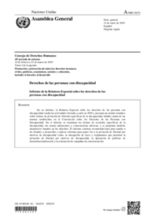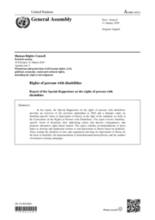Summary
In her report, the Special Rapporteur on the rights of persons with disabilities provides an overview of the activities undertaken in 2018 and a thematic study on disability-specific forms of deprivation of liberty, in the light of the standards set forth in the Convention on the Rights of Persons with Disabilities. The report reviews disability-specific forms of detention, their underlying causes and adverse consequences, and proposes alternative rights-based models. The report contains recommendations to assist States to develop and implement reforms to end deprivation of liberty based on disability. These include the abolition of laws and regulations allowing for deprivation of liberty on the basis of disability, the implementation of deinstitutionalization policies, and the conduct of awareness-raising campaigns.
Sections of the report relevant to the care of children with disabilities are highlighted below:
III. Deprivation of liberty of persons with disabilities
13. Persons with disabilities are significantly overrepresented in mainstream settings of deprivation of liberty, such as prisons and immigration detention centres. While it is estimated that persons with disabilities represent 15 per cent of the population, in many countries the proportion of persons with disabilities in prisons represents as many as 50 per cent of prisoners. Similarly, it has been well established that children with disabilities are overrepresented in juvenile detention facilities and residential institutions for children, such as orphanages, social care settings and small-group homes.
19. Children are particularly vulnerable to institutionalization on the basis of impairment. Many jurisdictions permit the forced removal of children with disabilities from their families and their placement in institutions, on the basis of the disabilities of the children and/or parents or guardians. As a result, millions of children with disabilities are confined to institutions, isolated and segregated from their communities. In these institutions, they are routinely locked, forced to take medication and often exposed to torture, abuse and neglect. The detrimental effects on child development of the placement of a child in any residential institution, even in small residential homes or “family-like” institutions, have been vastly demonstrated. Any placement of children in a residential setting outside a family must be considered placement in an institution and subject to the protections against deprivation of liberty.
23. While disability-specific forms of deprivation of liberty are particularly prevalent among persons with intellectual or psychosocial disabilities, they affect the whole diversity of persons with disabilities. In some countries, deaf and blind children continue to be institutionalized for no reason other than access to education. Persons with cerebral palsy are regularly placed into institutions for the purpose of “treatment” and “rehabilitation”. Persons with albinism are sometimes de facto deprived of their liberty in sheltered homes and protection centres. Persons affected by leprosy were sent for life to leprosariums.
IV. Underlying causes of disability-specific forms of deprivation of liberty
28. Furthermore, there is evidence that mental health professionals hold negative conceptions about the dangerousness of people labelled with a diagnosis of schizophrenia, which in turn serves to justify more restrictive policies in psychiatric facilities. Similarly, in many countries health-care and social care professionals encourage parents to place their children with disabilities in institutions under the false claim that they will receive better care than at home (see A/HRC/37/56/Add.2). Child protection authorities may also separate children from their families based on real or perceived disabilities of the parents without offering them the support they may need to keep their children.
30. Persons with disabilities are regularly deprived of liberty in order to access services that should have been delivered in the community. For example, many families send their children with disabilities to institutions (e.g. special education boarding schools, social institutions, vocational centres) because there is no other way to ensure access to education. Many persons with disabilities are also placed into residential institutions as a way to access social protection benefits. Lack of awareness also plays a role as it is often considered that persons with disabilities need specialized care that cannot be provided in the community.
31. Furthermore, when States fail to provide families with the necessary support, it may result in placement of their relatives with disabilities in institutions. Families that lack the social and financial support to provide adequate assistance to those with disabilities, or are unable to cope with the stress and pressure of providing around-the-clock support, are left with very limited options and driven to take them to institutions or hospitals.
V. Right to liberty and security of persons with disabilities
A. Universal recognition of the right to personal liberty
40. Deprivation of liberty involves a more severe restriction on physical freedom than mere interference with liberty of movement. Individuals are deprived of their liberty when they are confined to a restricted space or placed in an institution or setting, not free to leave, and without free and informed consent. Examples of deprivation of liberty include police custody, pretrial detention, imprisonment after conviction, house arrest, administrative detention, involuntary hospitalization, and placement of children in institutional care. They also include certain further severe restrictions on liberty, for example, solitary confinement or the use of restraints.
B. Normative content of article 14 of the Convention
48. Placing a person with disabilities into an institution, either without their consent or with the consent of a substitute decision maker, contradicts the right to personal liberty and the right to live independently in the community (art. 19). The failure of the State to provide persons with disabilities with the appropriate support to live independently in the community cannot constitute a legitimate ground for deprivation of liberty. Likewise, placing a child outside the family in an institution or residential home on the basis of an actual or perceived impairment of the child and/or of his or her parents or legal guardian is discriminatory and, therefore, arbitrary and unlawful.
51. Placement of children with disabilities outside a family into institutions or residential homes for the purpose of care constitutes an arbitrary deprivation of liberty that also contravenes the right to home and family (art. 23). Accordingly, where the immediate family is unable to care for a child with disabilities, States must provide alternative care within the wider family and, failing that, within the community in a family setting. The notion of “suitable institutions” under article 20 of the Convention on the Rights of the Child and the Guidelines for the Alternative Care of Children should be reviewed under the higher standards upheld by the Convention on the Rights of Persons with Disabilities. As article 41 of the Convention recognizes, its implementation should not affect any provisions of international law that are more conducive to the realization of the rights of the child.
VI. Ending deprivation of liberty on the basis of disability
B. Deinstitutionalization
68. Many strategies are required to end the institutionalization of children with disabilities. These include building up family support, the provision of child services within the community, child protection strategies, inclusive education and the development of disability-inclusive family-based alternative care, including extended kinship care, foster care and adoption. All these forms of alternative care need to be provided with appropriate training, support and monitoring to ensure the sustainability of such placements. States should adopt an immediate moratorium on the institutional placement of children under the age of 3.
69. States must take immediate action to end deprivation of liberty within private and/or faith-based institutions, such as orphanages, small group homes, rehabilitation centres and prayer camps. States have an obligation to protect persons with disabilities against wrongful deprivation of liberty by third parties, including through preventive institutional frameworks, education and monitoring. States must take immediate action to end all forms of home confinement and shackling.
E. Community support
77. Children with disabilities and their families must be provided with different types of information and support services, including early intervention, day care, education, child protection and social services, to avoid family separation and institutionalization. Families may also need assistance to understand disability in a positive way and to know how to support their children in accordance with their age and maturity. When family separation is unavoidable, States must ensure placement of children in appropriate family-based alternative care arrangements that meet their best interests. Smaller institutions, group homes or “family-like” institutions are no substitute for the right and the need of all children to live with a family.
F. Participation
79. In the process of law and policy reform to end all forms of deprivation of liberty based on impairment, States must closely consult with and actively involve persons with disabilities and their representative organizations, in particular those groups whose rights are directly affected, including children with disabilities. Likewise, persons with disabilities and their representative organizations must participate in all decision-making processes related to the design, implementation, monitoring and evaluation of mental health systems, including the development of non-coercive community-based responses.
VII. Conclusions and recommendations
85. The deprivation of liberty on the basis of impairment is a human rights violation on a massive scale. Persons with disabilities are systematically placed into institutions and psychiatric facilities, or detained at home and other community settings, based on the existence or presumption of having an impairment. They are also overrepresented in traditional places of deprivation of liberty, such as prisons, immigration detention centres, juvenile detention facilities and children’s residential institutions. In all these settings, they are exposed to additional human rights violations, such as forced treatment, seclusion and restraints.






